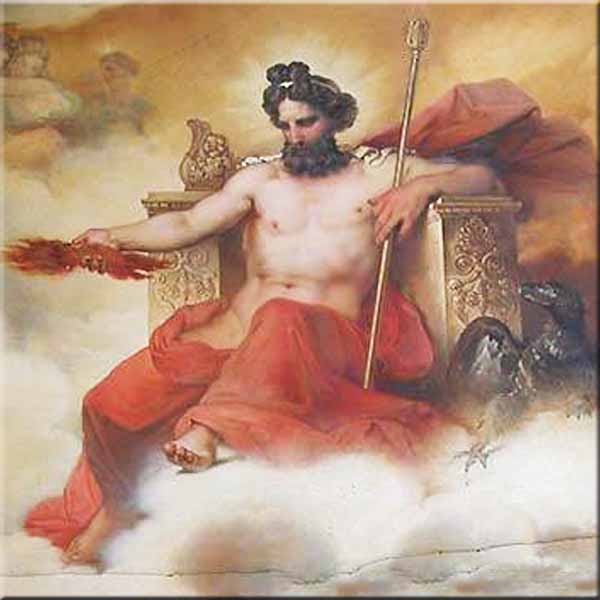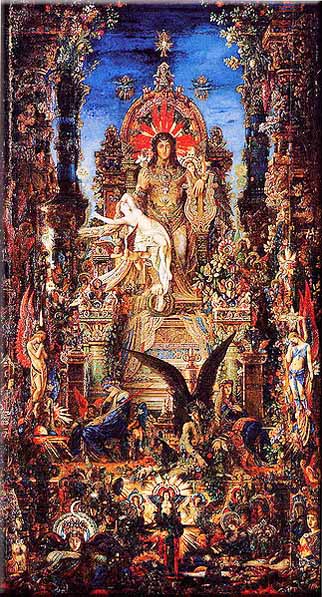Hercules’ Big Daddy
Carl Jung

Musée du Louvre ceiling fresco

Gustave Moreau
1894-95
Oil on canvas
(83.8 in × 46.5 in)
Musée National Gustave-Moreau (Moreau Museum), Paris
From Encyclopedia Mythica [This was the best summary of the myth of Zeus I found on the Web, better than Wikipedia]
Zeus, the youngest son of Cronus and Rhea, he was the supreme ruler of Mount Olympus and of the Pantheon of gods who resided there. Being the supreme ruler he upheld law, justice and morals, and this made him the spiritual leader of both gods and men. Zeus was a celestial god, and originally worshiped as a weather god by the Greek tribes. These people came southward from the Balkans circa 2100 BCE. He has always been associated as being a weather god, as his main attribute is the thunderbolt, he controlled thunder, lightning and rain. Theocritus wrote circa 265 BCE: “sometimes Zeus is clear, sometimes he rains”. He is also known to have caused thunderstorms. In Homer’s epic poem the Iliad he sent thunderstorms against his enemies. The name Zeus is related to the Greek word dios, meaning “bright”. His other attributes as well as lightning were the scepter, the eagle and his aegis (this was the goat-skin of Amaltheia).
Before the abolition of monarchies, Zeus was protector of the king and his family. Once the age of Greek kings faded into democracy he became chief judge and peacemaker, but most importantly civic god. He brought peace in place of violence and Hesiod (circa 700 BCE) describes Zeus as “the lord of justice”. Zeus was also known as “Kosmetas” (orderer), “Soter” (savior), “Polieos” (overseer of the polis, city) and “Eleutherios” (guarantor of political freedoms). His duties in this role were to maintain the laws, protect suppliants, to summon festivals and to give prophecies (his oldest and most famous oracle was at Dodona, in Epirus, northwestern Greece). As the supreme deity Zeus oversaw the conduct of civilized life. But the “father of gods and men” as Homer calls him, has many mythological tales.
His most famous was told by Hesiod in his Theogony, of how Zeus usurped the kingdom of the immortals from his father. This mythological tale of Zeus’ struggle against the Titans (Titanomachy) had been caused by Cronus, after he had been warned that one of his children would depose him. Cronus knowing the consequences, as he had overthrown his father Uranus. To prevent this from happening Cronus swallowed his newborn children Hestia, Demeter, Hera, Hades and Poseidon, but his wife Rhea (who was also his sister) and Gaia her mother, wrapped a stone in swaddling clothes in place of the infant Zeus. Cronus thinking it was the newborn baby swallowed the stone. Meanwhile Rhea had her baby taken to Crete, and there, in a cave on Mount Dicte, the divine goat Amaltheia suckled and raised the infant Zeus.
When Zeus had grown into a young man he returned to his fathers domain, and with the help of Gaia, compelled Cronus to regurgitate the five children he had previously swallowed (in some versions Zeus received help from Metis who gave Cronus an emetic potion, which made him vomit up Zeus’ brothers and sisters). However, Zeus led the revolt against his father and the dynasty of the Titans, defeated and then banished them. Once Zeus had control, he and his brothers divided the universe between them: Zeus gaining the heavens, Poseidon the sea and Hades the underworld. Zeus had to defend his heavenly kingdom. The three separate assaults were from the offspring of Gaia: they were the Gigantes, Typhon (Zeus fought them with his thunder-bolt and aegis) and the twin brothers who were called the Aloadae. The latter tried to gain access to the heavens by stacking Mount Ossa on top of Mount Olympus, and Mount Pelion on top of Mount Ossa, but the twins still failed in their attempt to overthrow Zeus. As he did with the Titans, Zeus banished them all to “Tartarus”, which is the lowest region on earth, lower than the underworld. (More)
Editor’s note and question: If the greatest influence on a child is the unlived life of the parents — what was Zeus’s unlived life?
